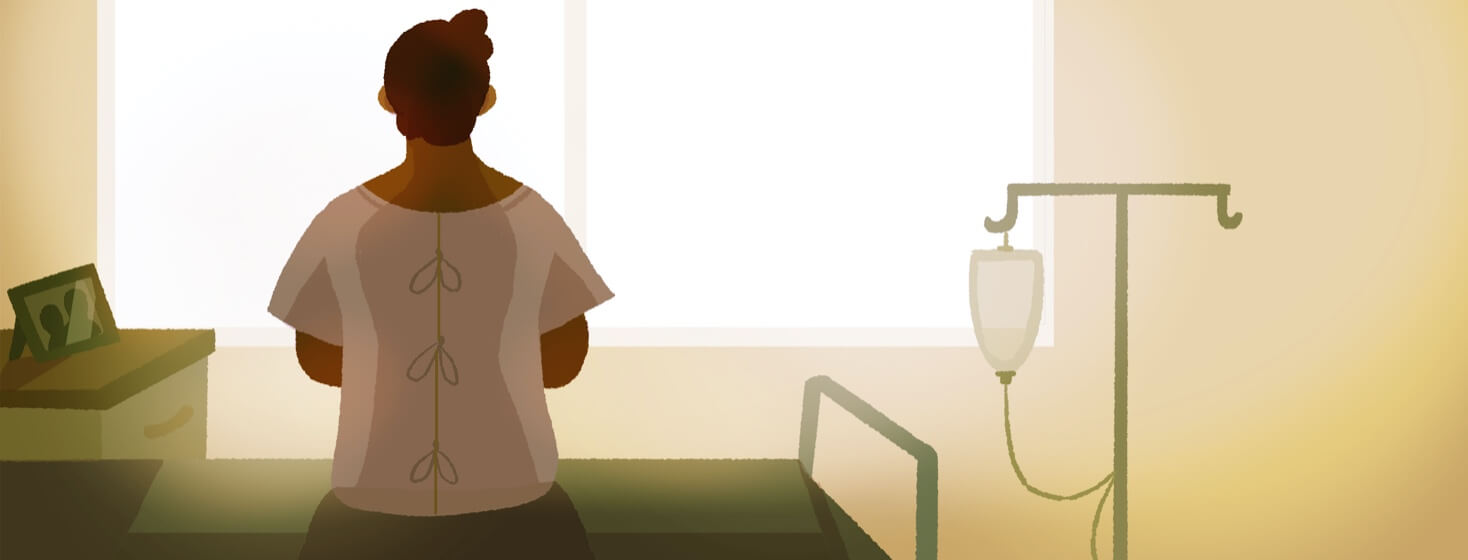Prioritizing Self-Care After Transplant
Undergoing a transplant is a difficult process for children and adults because each stage - from conditioning to stem cell infusion, and recovery - poses a different challenge. A common procedure for all transplant recipients, regardless of age, is chemotherapy and radiation which are essential parts of the conditioning regimen.
What is conditioning?
A conditioning regimen is one of several treatments used to prepare a patient for stem cell transplantation and is usually administered 5 to 10 days before transplant day (Day 0). The regimen includes chemotherapy, monoclonal antibody therapy, and radiation to the entire body.
The goal of conditioning is three-fold:
- Suppress the immune system so that the patient will not reject the new bone marrow;
- Make room in the bone marrow for the donor marrow stem cells to grow;
- Destroy any residual cancer cells.
According to the National Institute of Health (NIH), the intensity of conditioning regimens can vary substantially when selecting the optimal conditioning regimen for any given patient. Disease-related factors such as diagnosis, patient age, donor availability, and the presence of comorbid conditions need to be carefully considered before chemotherapy agents are administered because of their negative side effects.
Preparing for chemo and radiation therapy
In pictorial depictions of a patient undergoing chemotherapy, you often see hair loss and weight loss prominently highlighted. What you don't see is nausea, organ damage, possible infertility, cognitive issues, extreme fatigue, bruising, nail discoloration, swollen cuticles, hypopigmentation, and acne.
I started chemotherapy two weeks after IVF and my mantra at the time was "the journey of a thousand miles can be worthwhile if you take one step at a time." For me, that meant harnessing courage and willpower to keep moving forward because dwelling on hardships during that 6-month period meant looking backward; I just needed to focus on the road ahead.
Living with sickle cell for 32 years, I mastered the art of hiding pain and faking strength but full disclosure, for 80% of my transplant journey I felt like I was free-falling into a black hole. Ovarian stimulation and the egg retrieval process were brutal on my body and I had very little time to recover before the conditioning regimen started.
Side effects
The morning I was scheduled to get my first dose of chemotherapy (Day -21), I stood in the shower and couldn't stop my hands from shaking. I didn't want my mom to know I was nervous because she has a heart condition and I wanted to protect her so I pretended to be okay. While the nurse was setting up the IV, I excused myself and called an aunt in London who is a seasoned pharmacist. She said a short prayer and reassured me that I would get through it.
My body didn't get through two days of outpatient chemotherapy before I was admitted to the transplant unit and placed on pentostatin, oral cyclophosphamide, alemtuzumab (Campath), rituximab, and a low dose of total body radiation (300 rads). The side effects I experienced were nausea, vomiting, loss of appetite, mouth sores, and dizziness but honestly speaking, that was a cakewalk.
Agony in the transplant unit
Campath, on the other hand, was an express train to the pits of hell. The bone-crushing pain, fever, chills, temperature spike, fatigue, tremors, and abdominal pain made me question my decision to participate in the clinical trial. Watching me in agony was hard on my parents so I respectfully asked them to leave. I no longer had the bandwidth to hold back my anguish, tears, pain, and screams. The alemtuzumab dosing was administered over the course of five days and at some point, I was ready to die so I made my nurse promise to tell my family how much I loved them. Those were extremely dark days!
Total-body irradiation is done with high-dose anticancer drugs to help the patient prepare for a stem cell transplant. The procedure suppresses the immune system, destroys the cells of the marrow, and makes room for new blood stem cells to grow. It takes approximately 30 to 45 minutes to administer and for adult patients, you are required to lay completely still for the duration of the procedure. I'd compare the process to an MRI scan without the repetitive tapping or thumping noise of the imaging machine.
Bodily changes
The immediate side effects of radiation therapy for me were dry mouth, tiredness, skin darkening, sun sensitivity, dryness, and itching of the skin. Days later, my box braids started to fall out and I didn't want to wait for clumps of hair to fall because I looked like a frail black woman who stayed out in the sun for way too long. My eyes were yellow, my face was burnt, I lost 10lbs, and found the smell of food quite nauseating. That evening, we shaved my hair off and I chose not to look at a mirror because my self-esteem was going down a slippery slope.
When things fall apart, you have a strong desire to take back control so just like I had done with my nutritional habits, I got a little help from a friend. Dayo Lewis owns the online store Simply.Nisot that's dedicated to homemade skin and hair products for people of color. She customized my skincare regimen and introduced ingredients like shea butter, aloe vera, turmeric powder, and African black soap to my product mix, which actively saved my skin.
I take pride in being a girly girl and painting my own nails is therapeutic, so I covered my dark and brittle nails with polish.
Take care
Self-care practices before, during, and after transplantation are an integral part of a patient's recovery because you are practically rebuilding the body from the inside out.

Join the conversation